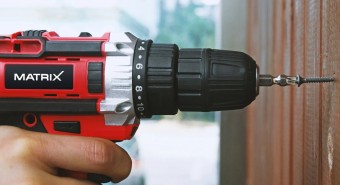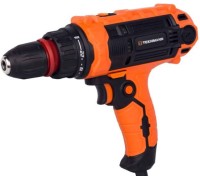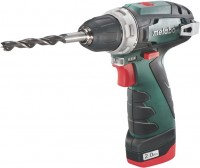What is the best screwdriver?
We independently test the products and technologies that we recommend.

Which screwdriver to choose: mains or battery? Which of them is better and more powerful?
I must admit: corded screwdrivers are already an endangered species. There are fewer and fewer of them on the market every year. Famous brands have almost stopped producing them (except for Makita and Hyundai), mainly Chinese manufacturers have remained. Therefore, those who work in production or construction have problems in order to buy a good corded screwdriver that you can rely on. Only such "niche" devices as drywall screwdrivers are not inferior to their positions. In this segment, wired tools are still more in demand than battery-powered counterparts.
Technologies have now stepped forward so much that battery-powered screwdrivers are already practically in no way inferior to network ones. They are just as powerful, but at the same time more convenient due to the absence of wires. The only thing that still does not please is the prices of the battery tool.
Which is the right way to choose a wired and cordless screwdriver? How much power should it have to be enough for everything?
If a good drill should have a power of at least 500 – 750 watts, then there are much more modest requirements for screwdrivers. In order to twist screws and self-tapping screws, a 300 Watt motor is almost always enough.
Manufacturers of cordless screwdrivers almost never indicate the real power of their products. In the case of a battery-powered instrument, it is better to talk about power classes that depend on the battery voltage. For example, in most cases, we can confidently say that a screwdriver with an 18 V battery is more powerful than a 12-volt one, and a 24-volt one has even more power. In more detail, the question of the power of the battery tool is discussed in the article "Which screwdriver is better: 12 V, 18 V or 24 V?".
Anyway, whether it is a corded screwdriver or a battery one, it is better to look not at the "power" column, but at the torque. It depends on him whether the tool will be able to twist a large self—tapping screw into dense wood, or he can only do "bugs" — small screws that fasten a thin metal profile. It is believed that a torque of 20-50 Nm is quite enough for a household screwdriver, and 75-100 Nm for a professional one. The biggest moment of screwdrivers with tangential impact, it can reach 150-200 Nm.
How to choose a good screwdriver for home? What functions should a tool have to work in a home workshop?
The best screwdriver for the house is the one that can not only twist fasteners, but also drill like a drill. Such tools are called drills-screwdrivers. They are usually equipped with quick—release cartridges (in which round drills and hex bits can be placed) and two-speed gearboxes (one speed for working with fasteners, the second for drilling). Thanks to the combination of the functions of a drill and a screwdriver, the combined tool almost completely covers the needs of a home craftsman.
When buying a battery tool, you should pay attention to the presence of a battery and a charger in the kit (however, the battery and charging for the tool can always be purchased separately). Small screwdrivers work, usually, from 12 V batteries. Such a tool is not very powerful, but lightweight and compact, so it is better suited for small hobby projects. Larger devices have 18-volt batteries with a capacity of 2-4 Ah. Eighteen volts are now considered something of an "industry standard" in the world of battery-powered power tools. For a home workshop, it is better to buy a drill-screwdriver complete with one or two batteries. Pay attention to the battery type. Lithium-ion batteries (Li-Ion) are considered the best, and nickel-cadmium (Ni-Cd) and nickel-metal hydride (Ni-Mh) are already obsolete. We talked in detail about the difference between them in the article "The main types of batteries".
In the catalog of drills and screwdrivers, you can notice that many models of the tool have additional functions and capabilities. For example, all screwdrivers, without exception, have torque adjustment and reverse, and most of them have backlight. Other options are less common. But they can be incredibly useful. For example, an additional handle, a shock mode and a depth limiter are simply necessary if you plan to drill solid materials often, such as bricks or foam concrete blocks. A case will never hurt, because it is very convenient to store and carry the tool in it. Motor protection and safety clutch extend the life of the screwdriver. But functions such as display and synchronization with a smartphone look like "pampering", they are unlikely to be useful to you while working in a home workshop.
How much does an average screwdriver cost?
"An average screwdriver" is a very extensible concept. As shown above, screwdrivers can be very different from each other. The price difference between network and battery devices is generally so large that the best wired screwdriver (the super-popular Makita DF0300 with a price of about $70) costs less than one battery from a rechargeable one.
Among the wireless models there is also a large variation in prices, even within the same brand. The cost is affected by the design of the tool and its configuration. For example, a small Makita DF330DWE screwdriver costs about $130, a more powerful Makita DDF343SHE model is closer to $200, and a brushless Makita DDF485RFJ from the latest LXT line is for $300. And which of them should be called an "average screwdriver"? All of them are neither low-cost Chinese nor "top" devices in their categories.
In general, we can say that among the corded screwdrivers, the "average" ones are those that cost between $40 – $50. Devices from this price segment will not disappoint you with their quality if you buy a tool for a home workshop. The battery models have a higher price. Here, the "average" technique is considered, which is sold for $ 100 – $ 200. This price segment includes the best models from "low-cost" brands with a good reputation and the simplest screwdrivers with nameplates of well-known brands.
What is the difference between a brushless screwdriver and a brush screwdriver?
Brushless motors are the most modern version of electric motors among those found in hand tools. They appeared relatively recently, and so far they are put only on "cool" screwdrivers. Brushless motors are better than conventional ones in almost all respects. They are smaller, lighter, more powerful, more reliable and use energy from batteries more efficiently.
The only thing that keeps screwdrivers with brushless motors from becoming more widespread is their price. So far, they are still much more expensive than tools with traditional collector motors. Although professionals are gradually switching to brushless screwdrivers, but it is not always justified to buy them for household work.
For a deeper dive into the world of modern brushless tools, he recommends reading the article "Brushless screwdrivers: why are they better than conventional ones".
Shock or shockless: which screwdriver is better?
Not all screwdrivers have a mechanism that allows the tool to work in shock mode. To be honest, it is not always needed, and many can do without it if they do not plan to drill brick walls or tighten large "crackers".
But those devices that have such a mode should be considered in more detail. The fact is that shock mechanisms are different.
- Axial impact is found in screwdrivers. This is a simple mechanism by which the tool slightly "chisels" with the tip of the drill, so that holes in durable materials, such as brick or foam concrete, are drilled faster and more confidently.
- Tangential impact occurs only in "clean" screwdrivers and wrenches. Such mechanisms are called impulse mechanisms. Due to the tangential impact, they briefly increase the torque to very large values (in the region of 150-200 Nm). This helps to tighten the fasteners with a very large force.
How to choose a screwdriver for working on metal, brick, wood?
We buy different drills for working on metal, wood and concrete, because we understand that these materials have different characteristics. About the same way you need to approach the choice of a drill-screwdriver. If you plan to drill metal, then buy a tool that, even under load, will be able to maintain the rotation speed of the cartridge in the region of 1000 rpm. Even simple and not very powerful screwdrivers are suitable for working with wood (but if feather drills or large crowns are used, then a large torque will be required). And for drilling bricks and concrete, the main issues are the presence of a shock mode, the ability to install an additional handle, as well as the efficiency of engine cooling and the quality of protection of the tool from getting abrasive chips inside the case.
Which brand of screwdrivers is better: "Bosch", "Makita" or "Metabo"?
There are not many big names in the world of power tools, and they are all well-known. The best screwdrivers are produced by DeWalt, Metabo, Makita, AEG and Bosch (we are talking about the "blue" series). All of them have an excellent reputation and give a good guarantee for their products. The instrument of these brands is considered professional or semi-professional.
Among other companies, manufacturers such as Festool and Milwaukee deserve attention. They are widely known all over the world, but their products are not so common in our market.
We will not agitate in favor of this or that brand. The firms listed above are approximately at the same technological level and top the ratings in all reviews. When choosing a cordless screwdriver, you should take into account the compatibility of its battery with the batteries of tools that you already have at your disposal, or that you plan to buy in the future. Therefore, it is not entirely appropriate to arrange a "zoo" of tools of different brands and systems in the workshop.
Which company's screwdriver is better to buy for home?
To work on weekends in a home workshop, it is impractical to buy a professional tool, it is better to take a household screwdriver from the average price category. He will not "eat" the family low-cost, but at the same time he will be a reliable and faithful "helper".
Companies that produce good household-class screwdrivers include Ryobi, Bosch ("green" series), Hitachi, Black&Decker and Stanley. You can also pay attention to the inexpensive "red" "Makita" (also known as Maktec) or the products of Hyundai, Einhell andYato. All the listed manufacturers have service centers in our country, and spare parts, components and accessories for screwdrivers of these brands can be bought freely and inexpensively.
The products of these brands are called "household tools" because they are designed for less intensive operation than professional screwdrivers. The difference is that simpler (and not so expensive) parts are used in household tools: motors, bearings, seals, gears, electronic components, etc.
How to distinguish a real screwdriver "Makita" or Bosch from a fake?
It is quite difficult, almost impossible for a layman to distinguish a real branded power tool from a high-quality fake. Crooks and "pirates" have long since learned not to make mistakes in the inscriptions of Bosch, DeWalt and Makita and not to hack quite so obviously. The difference between the original and the fake, usually, becomes obvious only during operation, when the "plasticine" gears begin to "crumble", weak bearings overheat and wedge, and motors with low-quality copper windings burn under load.
Therefore, the only sure way not to run into a fake is not to buy a tool at construction markets and in underground passages. It is better to order it in large and well-known online stores that work directly with manufacturers or importers. In this case, you will have an official guarantee and confidence that the money will be returned to you for the defective product.
Is there any reliability rating by which you can choose a screwdriver?
In our catalog, the rating of screwdrivers is formed automatically based on the interests of users. In it, you can see which brands and models are in the greatest demand, as well as which functions and configurations are of interest to buyers. Reviews of screwdrivers left by real users who bought the tool allow you to form your own opinion about the reliability of a particular device and learn more about its advantages and disadvantages. Users leave the most favorable reviews about screwdrivers from professional tool lines, because they have a long service life, good maintainability, an official warranty (usually from 3 to 5 years), and spare parts for them are easy to get.
So which screwdriver is better?
Alas, there is hardly an unambiguous answer to the question posed in the title of the article. It is impossible to choose any one screwdriver, because each of them has its advantages and weaknesses. Some models win in terms of power and torque, others in terms of battery life, and others in terms of price. The choice depends on the purpose, the volume of work and your preferences. You can read articles and reviews describing the TOP 5 screwdrivers in different categories and "nominations" in the corresponding section of the site.
If you prefer video rather than text, then watch our video on how to choose the right screwdriver.
Articles, reviews, useful tips
All materials
































































